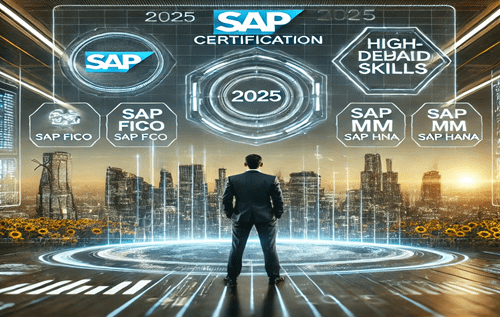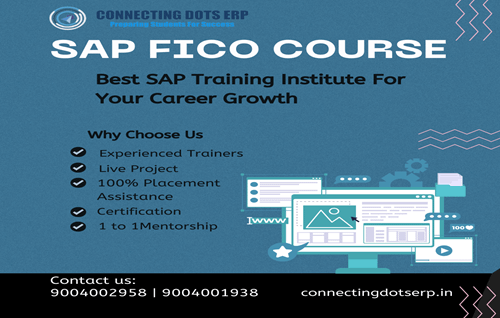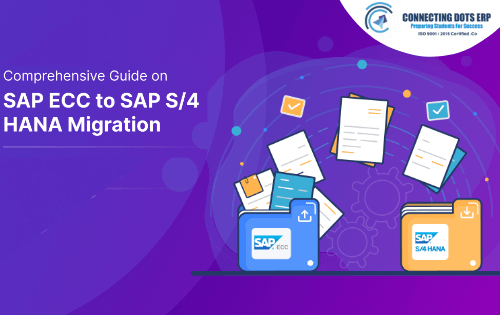Pune’s Top SAP FICO S/4 HANA Course: Become an FM Consultant!
An Introduction SAP Financial Accounting
SAP Financial Accounting Helps to Manage Financial Transactions and business processes in terms of data management. Financial Transactions are recorded in the Balance Sheet and become Statement. SAP S/4 HANA Finance is used for important financial purposes like profit, loss, and balance sheets in an organization.
It is a powerful module that can cover the business processes in every industry. Financial management requirements in large companies are constantly changing so it is more important for experts to keep upgrading their skills.
SAP FICO S/4 HANA Course can be integrated with other modules in SAP like material management sales and distribution, production planning, human resources, etc.
Journal vouchers are included in the company’s financial transactions.
SAP S/4HANA Financial Accounting is a sophisticated financial management and analysis solution that offers a wide range of benefits for all businesses.
Using in-memory computing and real-time data processing, SAP S/4HANA financial as well as other organizations handle their financial business processes operations.
Registration Link: https://connectingdotserp.in/
Call Now: 9004002958 / 9004001938
SAP S/4 HANA Finance Sub Modules
This includes providing complete reports for accounting for external and internal transactions of the organization, i.e. recording transactions like monthly records, debit and credit, balance sheets, and accounts.
Accounts used for reporting are managed by the General Leader. These are the accounts that will be used to prepare the financial statements.
This includes managing accounts payable-related data and records. Accounts receivable can handle invoice postings, down payments, and invoice payments, as well as execute customer reports. It is a submodule in SAP SAP Finance and Controlling in which all transactions with clients can be implemented and managed.
It can manage all asset-related transactions in Finance and Accounting.
When transactions in asset accounts are posted, the accounts in the general ledger are updated in real time.
These transactions include asset acquisition, asset sale, asset retirement, asset revaluation, asset transfer, and asset depreciation.
It captures all the transactions in the banking accounting and records on the bank statement for comparison with the transactions in the system.
Due to this, accurate financial statements in the system are updated in real-time from anywhere. Mainly it is related to all transactions like incoming and outgoing payments.
It enables an organization to consolidate financial statements for multiple organizations so that details from all organizations can be viewed simultaneously.
Travel Management: It supports business travel expenses within the organization, travel management plans, and travel expense reporting.
SAP CO Introduction
SAP CO is a separate module in SAP called the SAP Controlling Module. SAP CO Module is essential to improve the profitability of an organization.
Financial transactions from different modules are posted to the controlling module of SAP and reported in a structured way defined for internal management reporting.
SAP CO Module facilitates the planning, recording, and tracking of financial transactions in a company. Necessary expenditure planning and management can be done properly as well as optimization of business processes in the company.
Registration Link: https://connectingdotserp.in/
Call Now: 9004002958 / 9004001938
Sub Modules in SAP CO?
This analysis can be done based on the profit and loss statement of the organization. A cost element defines the cost-related elements incurred by the company.
Cost elements can be managed and configured in cost elements, profit, internal orders, functional areas, as well as master data.
The cost centre accounting sub-module deals with the costing of internal departments such as production, sales, and human resources.
It can create master data to track expenses by the department in the company.
The Profit Centre evaluates the profit and loss of the company. It accounts for shortages and costs and is done on a statistical basis. Apart from this, you can display the raw figures on return on investment, and working capital.
Internal order is a sub-module to provide service and work cost tracking. It uses work-related costs and orders under business transactions.
An internal order is used to plan the costs of a specific project in SAP Co. Also, Internal Orders are used to monitor production costs.
You can assign a budget and limit expenses by creating an expenditure budget in Internal Order.
Product costing allows singling out the cost of manufacturing a product. That is, for cost planning as well as the estimated cost of goods on hand and cost of products sold and preparing the bill of materials for finished goods in the company. To calculate product cost you need material master data, bill of material, and work centres.
Key Features of SAP S/4 HANA
· Simplified Data Model
· Real-time Analytics
· Digital Core
· Cloud and On-Premise Deployment
· Mobile Access
· User Experienced
· Enhance Business Performance
SAP S/4HANA Finance Innovations
· Changes from SAP ERP Financials
· Features Introduced as in SAP S/4HANA
SAP S/4HANA Finance Deployment Options
· On-Premise
· Cloud
· Two-Tier (Hybrid)
SAP S/4HANA Finance Migration Options
· Greenfield
· Brownfield
· Central Finance
Top Industries for SAP S/4 HANA Implementation
Registration Link: https://connectingdotserp.in/
Call Now: 9004002958 / 9004001938
SAP Project system
SAP S/4HANA Finance Benefits
Business Growth
· Faster customer lead time
· High data volume billing process
· Reduction in days sales outstanding
· Decrease In voice Processing Time
· Revenue Growth
· High accuracy for Transaction Processing
Profitability
· Days to Close Monthly Books Reduced
· Direct Material Spend
· Employee Productivity
· Optimized inventory management
· Reduced Total Cost of Ownership
Agility
· Business Client Satisfaction
Data Processing Performance
· Faster Reporting
· Days to Close Books
· Employee Productivity
· Order Processing Efficiency
· Reduction of Cost
· Reduction of Risk
· Reporting Efficiency
Who Should Learn?
Candidates having Bachelor’s or Master’s Degrees in the commerce field will be added advantages like BCOM, MCOM, MBA, ICWA, CA, and other financial backgrounds professionals.
Any financial executives and finance generalists can learn the sap fico s/4 hana course online.
Employees who are working in the financial division.
Graduate candidates looking for a prosperous career in the IT Sector will learn the SAP Fico Course in Pune.
Professionals who are switching careers to finance profession from any domain can learn a SAP fico course.
Strategies to Become an SAP S/4HANA Finance Consultant
- Achieve insight into the SAP ecosystem
To be hired as a SAP S/4HANA Finance Consultant, one must understand the Business Process of the SAP ecosystem, which includes various modules, technologies, and industry-specific solutions within the SAP system.
Familiarize yourself with functional modules like Finance, Controlling, and Sales & Distribution along with technical modules like ABAP Programming, Basis Administrator, and S/4 HANA.
- Attain the required education degree
A solid academic background is a cornerstone for a successful SAP S/4 HANA FI consultant career.
Employers usually prefer graduate candidates in Computer Science, Statistics & Maths, Finance Domains, Information Technology, Engineering or related fields. Additionally, a sound understanding of business processes, management principles, and industry-specific skills and knowledge is beneficial.
- Get Training from SAP Training Institutions
SAP S/4HANA Finance training is important to demonstrate proficiency in a specific SAP module or technology.
Some SAP Training Institutes provide various SAP Modules, and education designed by Certified Experts for different skill levels and specializations.
- Acquire Practical Experience
Practical, hands-on experience is essential to improve your knowledge & skills, and proficiency as a SAP S/4 HANA FI Consultant.
- Keep yourself updated according to Current Industry Trends
Being an excellent SAP S/4 HANA FI Consultant requires being updated with evolving technologies, features, radical changes in business, and best practices to achieve your goals in today’s competitive era.
Go through SAP-related news, blogs, press releases, and publications.
Attend SAP Online webinars, workshops, and conferences to stay updated.
Actively engage in online SAP communities and discussion forums to gain real-time insights.
Enroll with SAP Training Institution for complete knowledge updates.
Steps To Become an SAP S4 HANA FI Consultant
· Enhance your skills in Finance and Accounting
· Learn SAP S/4HANA Finance Module
· Keep on Practicing with real-time examples
· Attain Mock Interview Sessions for SAP S/4 HANA Finance
· Start an SAP end-user Job
· Work as SAP S/4HANA Associate Consultant
· Look for SAP S/4HANA Finance Consultant jobs
Job Oriented Concepts to learn in SAP S/4 HANA Finance
· Costing-based CO-PA and Account-based PA
· Universal Journal and Leader (BSEG and ACDOCA)
· GL-Settings in S/4HANA FINANCE
· Apps for General Ledger Accounting
· Cash Journal Entry and Master Data Maintenance in the SAP system
· Bank Accounting Management (BAM)
· Migration Process of the S/4HANA FINANCE module
· New Asset Accounting in S4 HANA and Changes
· Financial closing in SAP S/4HANA
· Profit Centre Accounting in SAP S/4 HANA FINANCE
· Taxation
· Profitability Analysis
· Customization – Data Migration – Activities after Migration
· Customizing Cash Management
· Reporting for SAP S/4HANA FINANCE
Registration Link: https://connectingdotserp.in/
Call Now: 9004002958 / 9004001938
Job Roles and Responsibilities of SAP S/4 HANA Finance Consultant
- Understand the SAP roadmap for S/4 HANA and become a trusted advisor for clients in driving their S/4 HANA adoption.
- Configure SAP System with CO module as per the requirements specified.
- Analyze, Research, Troubleshoot, and help resolve defects arising out of the process.
- Able to do regression testing and System integration testing.
- Configuration of SAP FI, and Central Finance modules in IMG based on business requirements Specify and document change requests (business process specification).
- Configuration of SAP Finance, and Central Finance modules in IMG based on business requirements. Hands-on expertise in implementation, and support with SAP S/4 HANA and Central Finance.
- Leading business requirements discussions with customers to implement S/4 HANA solutions in Finance & Controlling and related areas.
- Provide solutions including how to leverage standard SAP FICO S/4 HANA Finance functionality. Assisting in the testing process to discover errors and issues in business processes, documentation, or user’s lack of experience Application support, and training of end users.
- Guide clients through best-practice project scoping and delivery to ensure overall project success in implementing SAP S/4 HANA.
- Responsible for designing, building, testing, and deploying SAP FICO technical solutions encompassing RICEFWs (Reports, Interfaces, Conversions, Extensions, Forms, and Workflows).
- Experience in integration with other peripheral SAP applications as well as third-party non-SAP applications.
- Expertise in developing project estimation, staffing, and other pre-sales-related activities including RFP responses.
- Expertise in CDS View, Custom Analytical Queries, KPI reports, and Embedded Analytics.
- Possess integration knowledge of other modules like SD, MM, and Service.
- Handling/working of std. FIORI applications on the S/4 HANA platform
- Understanding, analysis, and timely resolution of issues faced during Project Deployment/support cycles.
SAP S/4 Hana Finance Job Profiles
- SAP S/4 Hana Finance Consultant
- SAP S/4 Hana Finance and Controlling Analyst
- S/4 HANA Finance Lead
- S/4 HANA Cloud Finance Consultant
- SAP FI S/4HANA Central Finance-Application Lead
- SAP FI S/4HANA Accounting-Application Developer
- SAP Fi S/4hana Accounting Business Process Architect
- SAP S/4 HANA FICO Lead
- Sap Finance Control Consultant
- SAP COFI-S/4HANA Functional Consultant
- SAP CO Management Accounting-Application Lead
- SAP FICO/HANA Consultant – E2E Implementation
- Business Processes Associate Consultant – SAP FICO
Registration Link: https://connectingdotserp.in/
Call Now: 9004002958 / 9004001938
SAP S/4 HANA FI Consultant Salary in India
SAP S4 HANA Finance Consultant Salary depends on your experience and skills. At the fresher level, you can get 1.8 lakhs p.a. to 3.0. lakhs p.a. After 2-3 years of experience you can get 3.5 – 4 lakhs p., so try to learn new technologies in SAP S4 HANA Cloud So that you demand the highest salary package. As mentioned on the pay scale, glassdoor, Ambition Box, etc. You can check the salary ranges for a SAP FICO Consultant.
SAP S/4 HANA Finance Future Scope
There will be good career opportunities in SAP FICO S/4 HANA Course Financial Accounting in the future. Now is the best time for you to learn SAP Financial Accounting. Once you develop the skills in the Configuration of SAP FI, you can perform well as an SAP FI Consultant in a large organization.
If you are working on implementing a project in the company then you will get expertise in configuration and design.
SAP S/4 HANA Fico Module offers many opportunities for your career growth and advancement.
Professionals with a strong background in finance and accounting and the ability to effectively use the SAP FICO S/4 HANA Finance Module are in high demand.
The SAP FICO S/4 HANA Module offers professionals the opportunity to work in various roles including consulting, analysis, project financial management, and training.
If you are working on a support project then you need to spend some time understanding the concept of design.
As your experience increases, you will become an expert consultant in SAP Financial Accounting.
With High Salary Packages and high-demand skills, SAP S/4 HANA FICO is an attractive career option for every expert consultant looking to pursue a career in Finance and Accounting.
You can learn FICO SAP S/4 HANA Course because SAP ECC is completely moved to HANA. If you are an expert in SAP FI you can also consider becoming cross-skilled which will take your career forward in the future.
Conclusion
SAP FICO has always been a module in demand among large industrial organizations. It helps organizations manage better business processes in terms of data management. But as the technology evolved into SAP cloud computing, services such as data storage, security, networking, software applications, and business intelligence became easier.
If you are looking forward to a good career in SAP Finance and Controlling then SAP FICO Course in Mumbai is a good option. Because we have great study places, well-equipped labs, convenient fees, and good placement assistance for the SAP FICO Course in Bangalore.
So, Clients are moving from ECC to S/4 HANA Finance. So all new and existing consultants looking for a career in SAP S/4 HANA Financial Accounting must upgrade themselves to S/4 HANA Finance instead of old FICO.











